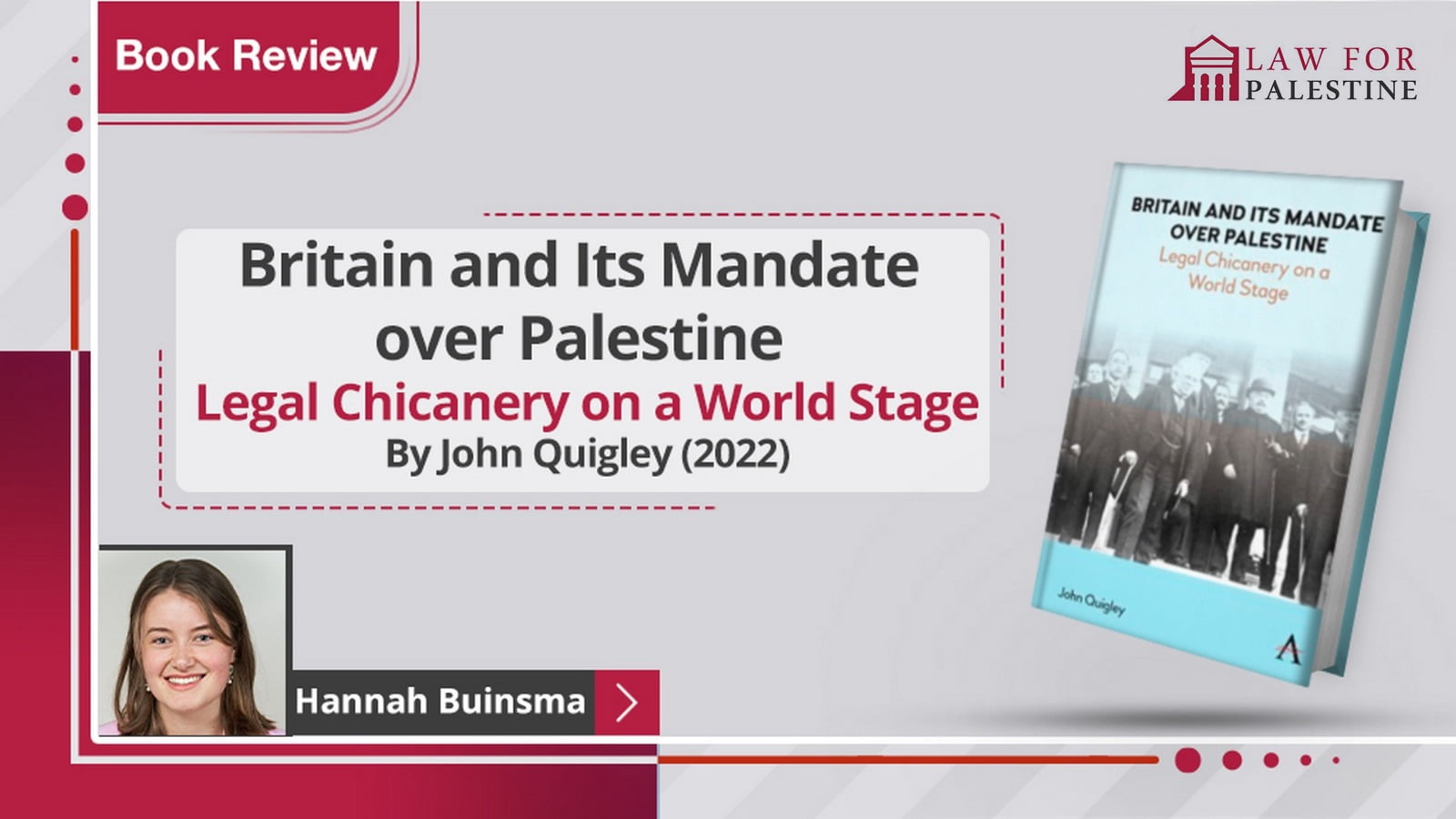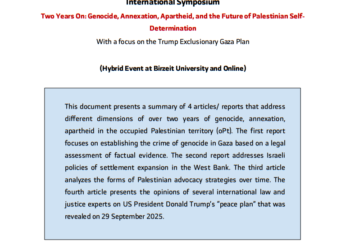Book Review | Britain and Its Mandate over Palestine – Legal Chicanery on a World Stage
By John Quigley (Anthem Press, 2022)
By Hannah Buinsma – Legal Researcher at Law for Palestine (Linkedin)
Edited by: Hassan Bin Imran
To download this article an a printable pdf document, click here
Book informationTitle: Britain and its Mandate over Palestine – Legal Chicanery on a World Stage (Link here) Author: John Quigley, Professor Emeritus, Moritz College of Law, The Ohio State University. Original language: English Publisher: Anthem Press Publication year: 2022 Number of pages: 220 pages |
Introduction:
The book is a noteworthy contribution to the historic analysis of the legality of the British Mandate in Palestine, delineated across its twenty concise chapters. The author challenges the prevailing perspectives on Britain’s role in Palestine by subjecting it to close legal scrutiny, revealing that Britain had no legal basis for its tenure in Palestine, the international community did not recognize the Jewish people’s right to self-determination, and the mandate document was not legally valid. The book draws on previously overlooked documentation to demonstrate that both Zionist and Arab perspectives fail to question the legal foundation of Britain’s actions. The author highlights a significant finding, which is a British Government pleading admitting that its presence in Palestine was due to military conquest and lacked a legal basis, a fact that has been hidden in plain view for a century. The thorough historic account and the novel arguments presented by the author makes this book a must-read for anyone wanting to gain a better understanding of the British Mandate over Palestine and its lasting impact.
The Balfour Declaration – Chapter 1 to 4
In the first four chapters of the book, the writer addresses three questions tapping on the impact of the Balfour Declaration; (i) whether the Balfour Declaration had any standing in law, (ii) whether the “national home for the Jewish people” meant a territorial state, and (iii) whether the Balfour Declaration was issued to promote rights of world Jewry, or whether its aim was elsewhere. The legal standing of the Balfour Declaration is important as it was the basis of the 1948 claim of Israeli statehood. The claim was based on the assumption that the Balfour Declaration had a normative force. However, the British Government saw it as a policy statement that could be reversed. Under international law, a unilateral declaration by a state can have a binding effect, but only if it is addressed to another state, phrased in a way that shows intention to take on a legal obligation, and issued with a certain level of formality and made public. The Balfour Declaration failed to meet these criteria, as it was not issued to a state, did not have a clear obligation, was informal, and was not made public.
The second question as to whether the British government’s intention with the Balfour Declaration was to establish a Jewish state is addressed in chapter three. In 1918, in response to the concern raised by Sharif Hussein bin Ali regarding the Balfour Declaration, the British government stated that it would support the aspiration of the Jews to return to Palestine, but that such a return would not come at the expense of the existing population’s political freedom. In addition, the author argues that in 1939 the British government committee confirmed that the Balfour Declaration did not envision a Jewish state, as it stated, in a message sent to bin Ali, that Arabs should “form a nation”, coupled with the characterization of the role of Jews in various countries, which signaled that a “national home”, mentioned in the Balfour Declaration, did not mean a state. However, the United Nations Special Committee on Palestine, which had been tasked with studying the Palestine issue, disregarded this interpretation when it produced its 1947 report. This was attributed to the efforts of the Zionist Organization, who had influence over the Special Committee through the Jewish Agency for Palestine, an entity created by the Organization. As a result, the writer argues that the report presented the United Nations General Assembly with a misleading picture of the legal situation of Palestine, inclined towards recommending its partition and the inclusion of a Jewish state.[1]
The aim of the Balfour declaration is delimitated in chapter four. The writer argues that the Balfour Declaration of 1917 was issued to promote the British war effort during World War I and not to proclaim Jewish rights in Palestine. The argument is based on the fact that the declaration was issued in response to Supreme Court Justice Louis Brandeis’ request to assure American opinion of the return of Jews to Palestine as a purpose of British policy. The War Cabinet saw the declaration as a useful tool for propaganda in both Russia and America. The motivation behind the Balfour Declaration was confirmed in a 1924 Colonial Office memorandum which stated that it had a “definite war object” and was designed to enlist the sympathy of influential Jews and Jewish organizations worldwide. Therefore, Balfour Declaration was not intended to help Jewry, but rather to help Britain.
The Paris peace conference and the San Romo Resolution – Chapter 5 to 7
In the fifth, sixth and seventh chapter, the writer outlines the emergence of the international community’s commitment for the Belfour declaration in the context of the peace process with Turkey. The fifth chapter describes the Paris Peace Conference in 1919, which provided a platform for the Zionist Organization to present its case for a Jewish national home in Palestine. The organization submitted a written proposal, which called for Palestine to be placed under British control as a mandate of the League of Nations, with the aim of ultimately creating an autonomous Jewish Commonwealth. During the conference, the Zionist leaders made no mention of the Arab population of Palestine and their efforts were aided by a lack of significant opposition.
The lack of opposition was partly because Britain prevented the Muslim-Christian Association from Jaffa to join the Conference, as the British authority worried the Association was not willing to accept British oversight. Moreover, Emir Feisal bin Hussein bin Ali, who was present at the conference and who had previously led Arab forces in conjunction with Britain against Turkey, did not adopt a staunchly anti-Zionist stance as he was motivated to collaborate with Britain in the post-war order. At the conference, the British government announced its plan to dissolve the Turkish empire, and a “[s]cheme for settlement” was tabled, showing Britain taking a mandate for Palestine and Mesopotamia (Iraq), and France for Syria, subject to the results of an opinion survey that France, Britain, and the United States were planning[2]. The conference resulted in a peace treaty with Germany but failed to make headway on a treaty with Turkey, and Palestine was not discussed. The Conference approved a Covenant for the League of Nations but, since no peace treaty was signed with Turkey, Turkey still held sovereignty.
Chapter six and seven outline the interest represented at the San Remo meeting by the various states present and the role of the San Remo meeting in shifting the narrative to the Balfour Declaration being a project supported by the international community at large. In 1920, the Allied Powers convened in San Remo, Italy for the purpose of negotiating a peace treaty with Turkey and to gain control of Turkey’s Arab provinces. Attending the meeting were representatives from Britain, France, Italy, and Japan, with the France and Britain particularly eager to acquire the Arab lands. There was hardly any representation of the international community, as the League of Nations did not participate in the meeting, and the effective participants were only Britain and France. The Balfour Declaration was discussed but the Allied Powers[3] did not accept an interpretation that included Jewish legal rights for Palestine. What was agreed at the San Remo meeting was nothing more than a common negotiating position to propose to Turkey. It was understood, in other words, that Britain could hold Palestine only if it gained sovereignty. At the San Remo meeting, the Allies agreed to include the Balfour Declaration in the peace treaty with Turkey on the understanding that political rights of the Palestinian population would not be impaired.
In chapter seven, the author demonstrates that the agreement to include the Balfour Declaration in the peace treaty with Turkey did not reflect the approval of Jewish rights in terms of territory. The governments’ reluctance to endorse Jewish territorial rights stemmed from a desire to preserve the civil & political rights of the Palestinian population, as well as concerns about the perceived superiority of Jewish rights over those of Muslims and Christians. Additionally, both the French and Italian delegation requested that Palestinian political rights be referenced in the draft of the Balfour Declaration. However, during the discussion of the Peace treaty, the Balfour Declaration became a diplomatic asset for negotiating other demands raised by states present in San Remo, reflecting their social and economic interests such as Iraqi oil, access to Jerusalem’s holy sites for Roman Catholics, and the control over Syrian land.
The Role of the League of Nations – Chapter 8 and 9
In chapter eight, the author reiterates the, in chapter 6 and 7 stated, conclusion that the League of Nations had no role in determining the fate of Palestine, and the commonly accepted analysis that Britain was given Palestine by the League of Nations is historically incorrect. The League Covenant merely recommended that Turkey’s Arab provinces should be administered as mandates rather than colonies, but it did not give any power to the League of Nations to enforce the mandate system. The League also had no role in determining which states would take on mandates, and the Allies did not have standing to “place” Palestine under Britain’s control. Therefore, Covenant Article 22, did not give the Council of the League a power to distribute territory. As a result, it could not give sovereignty to Britain. According to the author, the Zionist Organization and the Zionist Commission had a clear role in nudging Britain to declare its stay in Palestine. Britain’s unilateral assumption of power was executed by the introduction of new enactments such as immigration policies that favored Jewish immigration. These measures deviated from Turkish law and violated the law of belligerent occupation which demands the preservation of a status quo.
In chapter 9, the author addresses the question whether the League of Nations could have kept Britain from seizing control over Palestine. The author demonstrates that the League had very little operative power under Article 22 of the Covenant of the League of Nations concerning mandates. Consequently, the League had no control over Britain, as it was only able to express its opinion. The League of Nations’ lack of power was demonstrated by the fact that it was not able to intervene when Britain turned over the entire administration to the Zionist Organization.
Peace treaty with Turkey – Chapters 10 to 12
In chapter 10, the author outlines the historic account of the diplomatic bargaining in the time that the treaty of Sèvres remained unratified. The treaty of Sèvres (1920) was signed subject to subsequent ratification between the Ottoman Empire and the Allies of World War I. The treaty resulted in the relinquishment of significant portions of Ottoman territory to France, Greece, Italy, and the United Kingdom, in addition to establishing extensive occupation zones within the Ottoman Empire. In the period before the ratification of the treaty Italy, along with Japan and France, initially refused to approve the mandate terms until a peace treaty with Turkey was reached. The impasse, however, was resolved by behind-the-scenes political bargaining. Chapter 11 outlines the historical emergence of Treaty of Lausanne. In the Autumn of 1922, it was obvious that Turkey would not ratify the Treaty of Sèvres, which had a number of terms that Turkey found too onerous. New negotiations started with Britain, France, and Italy as the convenors. The so-called Lausanne negotiations resulted in signatures on a new peace treaty, on 24 July 1923, and ratification occurred 6 August 1924.
In chapters 12, the writer deconstructs the narrative that Britain gained a mandate under the Treaty of Lausanne. The primary reason the writer presents can be found in the language of the treaty which referred to the territories that detached from Turkey as newly constituted “states”, not the mandatories. Therefore, the territory of Palestine was being transferred to Palestine and its laws would govern Palestine. The questioning of the legal basis of the British mandate in Palestine is further supported by the Mavrommatis Palestine Concessions case at the Permanent Court of International Justice. In this case, the British government admitted “that there has been no succession between Turkey and Great Britain in regard to Palestine.” According to the Author, this was a remarkable admission for the British Government to make as it acknowledged that Britain had no legal standing in Palestine as was merely a military occupier.
In a relevant context, it’s worth mentioning that in 2022, international law expert Dr. Ralph Wilde published an article on the accountability of the UK for its failure to enable what was a form of self-determination for the Palestinian people during the League of Nations Mandate period and in 1948.[4] In the article, Wilde presents an argument, which is unacknowledged by Quigley, that the League Council exceeded its legal authority under the Covenant by incorporating the Balfour Declaration commitment into the Mandate Agreement without proper competence. This resulted in the Council acting ultra vires and encroaching upon the provisional recognition of independence and self-determination that the population of Palestine was entitled to, and which the UK was expected to implement. The UK’s actions proceeding on this erroneous legal basis were thus in breach of the Treaty of Versailles (The Covenant formed part of the Versailles Treaty). However, according to Quigley’s argument, the provisions of Article 22 of the Covenant of the League of Nations would not be binding regarding Palestine, as the article did not give the Council any power to distribute territory and therefore the Council could not give sovereignty over Palestine to Britain.
“Certain communities formerly belonging to the Turkish Empire have reached a stage of development where their existence as independent nations can be provisionally recognized subject to the rendering of administrative advice and assistance by a Mandatory until such time as they are able to stand alone. The wishes of these communities must be a principal consideration in the selection of the Mandatory.”
Article 22, The Covenant of the League of Nations
Wilde articulated in his article, which was published shortly before the book was released, an argument which challenges this notion. Wilde argues that despite any infringements of international law, Palestine remained incorporated within the scope of the Mandates system, and that, while technically invalid, the Mandate Agreement was still binding. Therefore, he argues that the Mandate Agreement did not vary the provisions of Article 22, legally, and so insofar as its provisions purported to do so, they had no legal effect. This preserves what was effectively a form of self-determination for the Palestinian people that Article 22 of the Covenant stipulated for them as inhabitants of a so-called ‘A’-class Mandate, and therefore the capacity to take legal action against the UK before the ICJ in accordance with the conflict resolution provisions of the Mandate Agreement. Wilde’s article appears to suggest that Professor Quigley could expound on the ramifications of the position that Palestine is not lawfully incorporated into the Mandate system. The elaboration could entail examining the implications of this reality on the Palestinian people’s right to self-determination as enshrined in Article 22 of the League of Nations Covenant, as well as their capacity to seek justice at the ICJ.
Palestinian Mandate document – Chapters 13 to 16
In chapter thirteenth, the author critiques the claim that the Palestine Mandate Document was “an international instrument guaranteeing to the Jewish people special facilities for immigration and settlement throughout Palestine”. The writer argues that the Palestine mandate document lacked the hallmarks of a treaty, it did not read like a treaty, it was not registered as a treaty, and it was terminable by Britain. Moreover, when the League of Nations did dissolve in 1946, Britain did not declare the mandate document to be of no effect. Had it been a treaty, the disappearance of that party would have meant a loss of legal force.
In chapter fourteen, the author addresses the argument that the Mandate explicitly recited the Balfour Declaration and charged the mandatory with putting it into effect and concludes that it has no basis in historical facts. Britain decided unilaterally to implement the Balfour Declaration and it was not told to do so by the League of Nations.
In the fifteenth chapter, the author outlined the role of the Zionist in formulating the Mandate document. The writer argued that the submission of this draft was a considerable infringement of international protocol. A private organization proposing a document that would be issued by an international organization, and that would impact the governance of a certain territory, was unprecedented and unsanctioned, particularly, because it was a manifest violation of the League’s Covenant, article 22, as the mandate ignored the wishes of the population. In the sixteenth chapter, the author addresses the aspect of only one “people” having the right to self-determination. The author argues that the claim of a right for the Jewish people was particularly problematic since they did not inhabit the territory of Palestine, and a people making a claim to a territory typically inhabits that territory. In addition, the League Council never considered the question of how to characterize Jewry and therefore it was never defined if the identity of Jews is characterized by religion, a people, a series of minority groups, or something else.
Critique faced by Britain on the Mandate – Chapters 17 to 19
In 1923 the Britain’s government acknowledged its inability to implement the Balfour declaration, following national and international critique. The government considered the option to return the Mandate into the hands of the League of Nations, however it assumed it would have to evacuate Palestine and that it would seriously affect their hold upon the Suez Canal. Therefore, decided to not leave Palestine and continued with the mandate. Chapter nineteen describes the situation in 1932 where Britain did not grant Palestine tariff preference, as other major treaty partners did not recognize Britain as having legal status in Palestine. Britain’s treaty partners considered Palestine as a “foreign country” and therefore did not accept Britain’s granting it a tariff preference.
The author argues that these facts reiterate the point made that Britain lacked a legal status in Palestine. The historic overview of the British Mandate in Palestine by the author ends with the dissolution of the League of Nations in 1946. The event casts uncertainty on Britain’s role in Palestine, as the League’s mandate for Britain to govern Palestine may have lost legal force with the League’s extinction. The mandates were asked to continue administration until further arrangements were made as Britain did until 1948.
The author’s recommendations
The author concludes the book with a postscript, arguably the most fascinating part of the book as the author examinees the implications of the absence of a lawful foundation for the British mandate in Palestine. The most important implication the author mentions that Britain’s lack of legitimate legislative authority during its control of Palestine undermines the legality of Israel’s current application of legislative and regulatory acts adopted by Britain. Additionally, the author addresses the lack of recognition by the British Government for its rule without a legal mandate over Palestine. The author proposes that Britain could take diplomatic measures in order to rectify the situation. These include a formal apology by the British Government and supporting the prosecution in the International Criminal Court of acts victimizing the Palestinian people.
The author concludes with the argument that the international community’s approach to the Arab Israeli conflict could be radically different if world leaders were to recognize that Britain ruled Palestine without a legal basis and that the League of Nations never sanctioned Jewish territorial rights. The author’s proposed measures appear to be exclusively cantered on potential courses of action that the British Government could take in order to rectify their past mistakes. However, the book did not address any legal avenues that the Palestinian people could pursue in order to seek redress for the British government’s lack of legislative authority during its mandate.
Conclusion
Britain and its Mandate over Palestine is an extensive historical account that thoroughly describes the British political interference in Palestine, which has not been done previously. Quigley is able to provide a convincing argument for the illegality of the British mandate and proofs that the widely accepted claim that Britain was given Palestine by the League of Nations or that the League of Nations mandated Britain to create a Jewish homeland is historically incorrect. The author reveals that Britain’s presence in Palestine was not based on any legal entitlement, but rather was the result of a military conquest that was never recognized by the international community. It further contends that the League of Nations made no rights available to Britain or to the Jewish people and that the mandate document that Britain crafted was invalid. In presenting these facts, the author exhibits a remarkable ability to interpret the underlying interest of the British authorities, backed by evidence. This lends the book a unique quality, offering not only a historic research account, but also an insightful exploration of British motivations for its Mandate.
The postscript appended to the author’s book introduces a crucial dimension to his argumentation, as it explores the contemporary implications of Britain’s disputed mandate in Palestine. Moreover, the postscript enriches the author’s work by offering insightful recommendations for the British government to pursue as a means of redressing its past transgressions.
One could argue that the book would have benefited a more pervasive connection to the implications of the Mandate in order to further enhance its relevance to the present-day situation in Palestine. Specifically, the author could have elaborated on the potential consequences of his assertion that there has been no succession between Turkey and Great Britain in regard to Palestine. Such elaboration could have shed light on how this assertion impacts the ability of Palestinians to seek legal redress at the ICJ. Nevertheless, Britain and its Mandate over Palestine provides an exceptional shift in the narrative which previously had been heavily influenced by British accounts and rewrites the history of Britain’s role in Palestine.
[1] Former UN Special Rapporteur Prof. Michael Lynk highlighted the bias and chaotic work of the UN Committee in a piece he published under the title: “Prelude to Partition: 75 Years Ago, a U.N. Committee Determined Palestine’s Fate” retrievable through: https://dawnmena.org/prelude-to-partition-75-years-ago-a-u-n-committee-determined-palestines-fate/
[2] Memorandum Submitted to the Council by Mr. Lloyd George, Scheme for settlement in the Turkish Empire, 21 May 1919, Foreign Relations of the United States: Paris Peace Conference 1919, vol. 5, at 770.
[3] The “principal” Allied Powers consisted of Britain, France, Japan, and Italy
[4] Recently, Ralph Wilde, in collaboration with Shawan Jabarin, published a blog post on Opinio Juris that seems to serve as summary of Wilde’s article. Link to the blog post is available here







